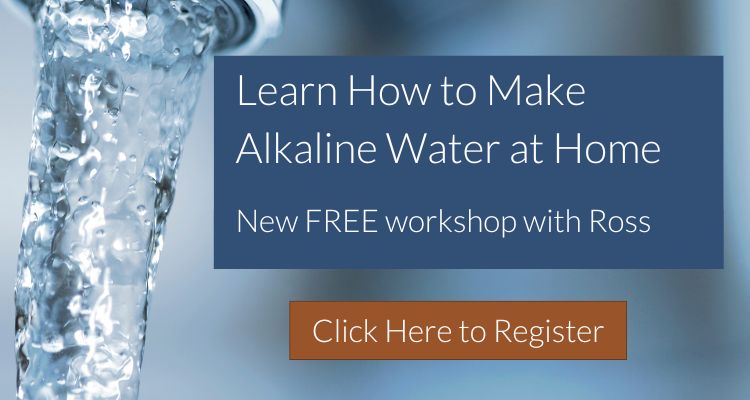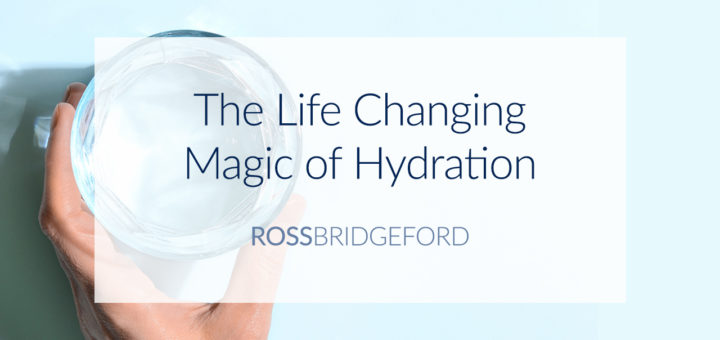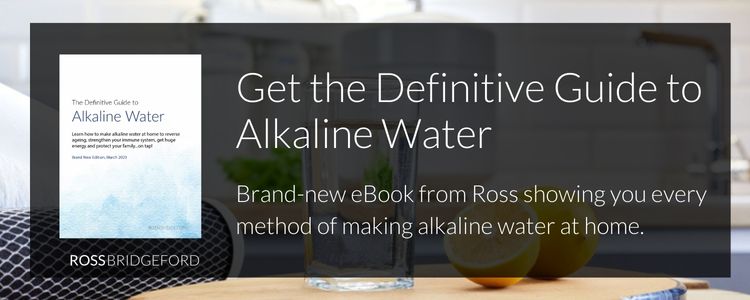Life-Changing Magic of Hydration
Sometimes something so simple can create amazing results. But because it’s so simple we overlook or ignore it. Hydration is the epitome of this. And in this guide I will give you all of the motivation AND tools to make super-hydration a part of your daily life.
If you have digestive issues, chronic fatigue, excess body fat, a weak immune system, skin issues, frequent coughs and colds, reflux, migraines, candida or low libido(!) – dehydration is undoubtedly a big part of the issue, and getting properly hydrated will create a noticeable difference in 24-48 hours.
It’s that powerful, yet because we know it we so frequently ignore it.
I suffered with terrible skin all through school, college, university and even into my first couple of jobs out of uni. I blamed genes, hormones, bad luck.
If I had only known proper hydration was the answer. It certainly was for me.
After drinking an average of 3-4 litres of good quality water each day, my skin was noticeably better after 2 days and practically cleared up within a week.
Bear in mind I was not living a healthy diet at this time. At university, I would regularly be succumbing to the munchies at 2am.
Yet, simple hydration made a dramatic difference. It was my cure.
I now never go a day without drinking at least 3 litres of water, and often strive for 4 and beyond.
It keeps me energised, feeling full of vitality and yes, keeps my skin clear!
Am I Dehydrated?
Unless you’re drinking at least 2-3 litres a day, you probably are. If you’re also drinking tea (regular, milk & sugar etc. not herbal), coffee, soda or alcohol then it’s even more likely.
A dry mouth and throat is one symptom you would recognise, but you may also experience:
- Fatigue and/or dizziness
- Foggy thinking
- Poor concentration
- Mood swings
- Chills
- Headaches
- Migraines
- Cramps
- Aches and pains
- Constipation
- Infrequent urination and dark coloured urine
- Bad breath
- Sugar & carb cravings
- Dry skin, dark coloured rings around eyes
- And a whole lot more…
If you ARE dehydrated, the good news is that you’re about to see a huge uplift in your health, energy and movement towards your health goals – simply by drinking more water.
The Evidence-Based Dangers of Not Drinking Enough Water Each Day
Chronic, mild dehydration (defined as you not drinking enough water, not dehydration as a medical condition), has recently been linked to a whole host of health challenges.
The research is only just gaining traction now, as the problems associated with drinking too little water every day are only starting to get mainstream attention.
I’ve discovered hundreds of research papers in this area (some of which are in the pre-publication/review stage so haven’t yet been published – the research is that new).
Here are some of the highlights:
STUDY: Hydration, Weight Gain & Obesity
Recent research published in the journal Annals of Family Medicine in 2016 has proven that those who don’t keep hydrated enough had a 150% greater risk of being overweight.
The researchers tested over 9,500 adults between 2009 and 2012 and looked specifically at the correlation between BMI and dehydration.
Their conclusion was telling:
We found a significant association between inadequate hydration and elevated BMI and inadequate hydration and obesity, even after controlling for confounders. This relationship has not previously been shown on a population level and suggests that water, an essential nutrient, may deserve greater focus in weight management research and clinical strategies.
Source: Chang T. Ravi N. Plegue MA. Sonneville KR. Davis MM; Inadequate Hydration, BMI, and Obesity Among US Adults: NHANES 2009–2012; Annuls of Family Medicine; July/August 2016 vol. 14 no. 4 320-324
STUDY: Hydration, Concentration & Cognitive Performance
A study published in the International Journal of Psychophysiology in 2004 found that dehydration was directly linked to mental fatigue, fogginess, poor concentration and poor memory.
lower hydration status was related to slowed psychomotor processing speed and poorer attention/memory performance, after controlling for demographic variables and blood pressure.
Source: Suhr JA, Hall J, Patterson SM, Niinistö RT.; The relation of hydration status to cognitive performance in healthy older adults; Int J Psychophysiol. 2004 Jul;53(2):121-5.
Interestingly, in another study conducted by researchers at Loughborough University and published in the medical journal Physiology and Behaviour, the researchers found that even mild dehydration impaired driving skills to a level similar to the British drink driving limit.
They reported:
“To put our results into perspective, the levels of driver errors we found are of a similar magnitude to those found in people with a blood alcohol content of 0.08%, the current UK legal driving limit. In other words, drivers who are not properly hydrated make the same number of errors as people who are over the drink-drive limit.”
Pretty scary and goes to show how much of impact dehydration can have on your mental alertness or fatigue.
Source: Watson P. Whale A. Mears SA. Reyner LA. Maughan RJ; Mild hypohydration increases the frequency of driver errors during a prolonged, monotonous driving task; Physiology & Behavior; Volume 147, 1 August 2015, Pages 313–318
STUDY: Hydration & urolithiasis (kidney, bladder and/or urinary tract stones)
In their research published in the European Journal of Clinical Nutrition, researchers Siener and Hesse examined the relationship between fluid intake/urination volume and urolithiasis. They discovered a strong correlation between dehydration and stone formation and recurrence:
A sufficient intake of fluid is one of the most important preventive measures for stone recurrence.
Source: Siener R. Hesse A.; Fluid intake and epidemiology of urolithiasis; European Journal of Clinical Nutrition (2003) 57, Suppl 2, S47–S51
STUDY: Hydration & Heart Disease
A six-year study published in the May 1, 2002 American Journal of Epidemiology found that those who drink more than 5 glasses of water a day were 41% less likely to die from a heart attack during the study period than those who drank less than two glasses.
Source: Chan J. Knudesen SF; Water, Other Fluids, and Fatal Coronary Heart Disease: The Adventist Health Study; Am J Epidemiol (2002) 155 (9): 827-833.
And Everything Else: Constipation, Asthma, Hyperglycemia, UTIs, Hypertension, Heart Disease and more!…
In the journal Nutrition Review, researchers Manz and Wentz reviewed hundreds of longitudinal studies and found strong correlations between chronic mild dehydration and all of the above.
There is increasing evidence that mild dehydration plays a role in the development of various morbidities…Positive effects of maintenance of good hydration are shown for urolithiasis; constipation, exercise asthma, hypertonic dehydration in the infant, and hyperglycemia in diabetic ketoacidosis; urinary tract infections, hypertension, fatal coronary heart disease, venous thromboembolism, and cerebral infarct; and bronchopulmonary disorders.
The picture is clear. You HAVE to drink PLENTY of good quality water every day!
Source: Manz FD. Went A.; The Importance of Good Hydration for the Prevention of Chronic Diseases; Nutr Rev (2005) 63 (suppl_1): S2-S5.
How Much Water Is Enough? What About 8 Glasses a Day…?
Enoughness. A very ambiguous concept. But not when it comes to hydration.
In my 16 years of coaching and teaching the alkaline diet, I’ve found that ‘enough’ for 90% of people is around 4 litres (120-130oz) per day on average. Sometimes a little less, sometimes a little more.
If you’re well outside your target weight then you may need a little more (up to 5 litres) while your weight comes down.
If you have a lot of muscle and/or are exercising vigorously then you will need more too.
The basic equation is:
>> 34 oz (1 litre) of water per 40lbs (18kg or 2.85 stone) of body weight
For example:
76kg / 18kg = 4.2 litres (142oz)
167.5lbs / 40lbs = 4.2 litres (142oz)
Again, this usually works out to be about 100-130oz (3-4 litres) for most people.
Seems a Lot More Than 8 Glasses…?
It is. 8 regular-sized glasses would be around 2 litres (67 fl. oz or half a gallon).
This is half the amount I recommend.
Why? Because in all of my work over the past 16 or so years, I have seen significant improvements at the 3-4 litre range compared to the 2 litre range.
And the ‘8 glasses a day’, while realistic etc. is also the recommendation from the mainstream. And they’re still telling you to eat grains, low fat, that dairy is great for you and you won’t get enough calcium or protein unless you drink milk and eat steaks.
If you’re not convinced, try it for yourself: go for 8 glasses (2 litres/ half a gallon) for 2 weeks, and then switch to 4 litres (a gallon) for 2 weeks. You’ll see which makes you feel better and can stick with whichever the winner is.
Why Don’t You Drink Enough & Overcoming the Two Biggest Issues
Aside from thinking:
“Hydration, yeah I know, of course”
And then doing nothing about it, there are two principle reasons people don’t/can’t drink enough water.
To the hydration-aware, and even the most motivated water-sippers, there are two main challenges:
1) REMEMBERING to drink enough
2) PHYSICALLY BEING ABLE to drink enough!
Let’s address both of those…
HYDRATION CHALLENGE 1: REMEMBERING to drink enough
This is probably the biggest of the challenges when it comes to hydration – and I have been through this too! You get to the end of the day and think “NOT AGAIN…I forgot to drink any water!”…
At this stage trying to down four litres before bed is not smart. You can try, but it won’t work out too well for you, or your bedmate!
If this happens to you – just have a big glass of water and put in to place a couple of the reminders and tips I’ll give you below.
HYDRATION CHALLENGE 2: The BLOAT & The TOILET FREQUENCY!
The second concern is physically feeling able to drink that much without needing to go to the toilet every two minutes and feeling as bloated as a whale!
My advice here is to just take it slowly and build up…
Don’t try to go from zero to four litres (a gallon) in 24 hours.
Set yourself the target of 1.5 litres (50 fl oz) for the rest of this week…then 2 litres next week, 3 litres the next…
The more you build up, the more your body will get used to it. The more you get used to it, the more your body will be able to USE the water you consume. It won’t just wash straight through into your bladder.
An analogy I like to use is to imagine your body like a dried up sponge. When you first start drinking water it’s like running a dried up sponge under a faucet. The water just runs straight over it and down the sink. But little by little, the more you run the water over the sponge the more it begins to absorb…and after no time at all the sponge is now able to hold an incredible amount of water to do its job.
Your body is just like this. The more hydrated you get the more your body will be able to hold comfortably. You won’t feel bloated at all. And the more hydrated you get the LESS frequently you’ll need to go to the toilet.
Everything will get easier the more you do it, so just ease in, take it a day at a time. If you mess up one day, don’t worry about it! Just have a glass of water then and there and get back on with your plan the next day!
Tips for Remembering to Drink Enough / Making Hydration Delicious & Easy
Step One: Carry a Big Bottle
This is the best tip – because it makes sure you always have your water on you to sip. I personally like to have a big 1-litre (35oz) bottle at all times and when I do this I always drink my 4.2 litres! Really simple, but SO effective. How many times are you sat at your desk, thirsty as hell, thinking – when I finish this task I’ll go get water…and then 2 hours later you’re still sitting there thirsty?
Step Two: Set a Reminder
This isn’t something you will have to do forever, but I recommend you set an hourly reminder on your phone or watch to beep and remind you to have a big gulp or a glass of water every hour. It is amazing how often you suddenly realise it is lunchtime and you’ve not really had anything to drink!
Step Three: Substitute
For every other drink, you go to have, be it tea, coffee or juice – substitute in water. You will be surprised at a) how good it makes you feel and b) how much of a pat on the back you can give yourself afterwards. This simple tip can lead to some really good, positive reinforcement that yes, you can say no and it makes you even more healthy!
Step Four: Always Have Water At Your Desk
Building on Step One – simply having a bottle at your desk at all times means that when you do remember you can tuck straight into it, rather than thinking “oh yes, water, now let me just finish this email first”.
Step Five: The Power of Tea!
Herbal teas are alkaline! Mostly. You only really have to avoid green and white tea and the rest are caffeine-free and alkaline. I find this is a great way to beat the boredom of plain water and it gives me at least a litre of hydration per day. My favourites are peppermint, Rooibos, caffeine-free chai, ginger and orange. Delicious hot or cold!
Step Six: Flavour!
Water is water and it’s pretty dull. That’s ok. Try to see hydration as a source of health and energy rather than a source of flavour. However, remember – you can add lemon, mint, lime, grapefruit…all manner of fresh stuff added in to make water more enjoyable. I’m personally loving lime and mint at the moment. Mint grows like nothing else in the garden too – so you can get it in abundance for free (or in a pot if you’re living in a unit). Genius.
Step Seven: Know your Outcome and Plan your Route to Success
Set goals. Write them down. Track your progress. Read your goals aloud day and night. Honestly, being hydrated is THE most important part of any health goal and will get you a long way towards where you want to be, whether that is weight loss, weight gain, muscle growth, more energy, better digestion, better skin…
Free Download: Hydration Tracker
Is Tap Water OK? What Kind of Water Should I Drink?
This is a BIG question and fills a guide all by itself…
The easiest thing for me to do is to give you some basic guidelines here and point you to my free guide to Alkaline Water where I discuss this in huge depth – what water to drink, which filters are best, how to make alkaline water, etc.
At the very least you should be looking to filter your tap water – a simple countertop jug type filter is a good start. Look for one that removes bacteria and chlorine. These simply can’t properly remove fluoride so don’t believe it even if it says it can. It can’t.
Bottled water is held to less strict standards than tap water for contaminants, bacteria and toxins. Plus it’s water that’s been sat in toxic plastic for up to 12 months or more. Plus it’s terrible for the environment. Plus bottled water is acidic and oxidising to your body (i.e. it kills cells).
So I’d rather you drink filtered tap water than bottled and this is a good start for most people.
To take it up a notch there are a few different ways to make your water more alkaline, more filtered and better for you.
I cover all of these – the pro’s and con’s of each and the honest truth on each in my Definitive Guide to Alkaline Water here.
Get Started Now
Being properly hydrated will do SO MUCH for your health, your energy, vitality, immunity, digestion, liver, kidney, heart, your brain…
Fatigue will start to disappear, weight will shift, inflammation will cool, digestion will ease, your skin will become clear…
So what are you waiting for?
Don’t let the research and time needed to get the right filter or ioniser slow you down – just start drinking enough now!
Remember: being hydrated with tap water is still MILES more healthy than being dehydrated.
Make a Plan
Work out how much you need to drink each day, and set a target for this week, next week and the week after to build up to your goal amount of water/day.
Use a combination of 3 or more of my tips above to help you to remember and keep it enjoyable!
Remember – it doesn’t have to be plain ol’ water! You can have lemon water, herbal tea, iced tea, water infusions, vegetable juices & smoothies and more. Make it delicious and make it work for you. And you can use this simple hydration tracker to print and stick on your fridge or carry around with you too:
Free Download: Hydration Tracker
Read Next: Five Simple Ways to Combat Fatigue, Quickly







Hello, I have not received my “Definitive guide to alkaline water” yet. I’ve signed up to receive it twice, just checking in on the status of that
I am 84. I eat 2 meals a day, no snacks. If I drink a lot I can’t eat … I don’t know how to handle ……..
I can’t seem to get your information on how to make alkaline water. I put in my info. and never get the email on how to do it. Please help.
This looks like an old post, so not expecting an answer. I put my name and email in to get the “Definitive Guide to Alkaline Water” but I only get an email to click on “Life-Changing Magic of Hydration”. How can is get the “Definitive Guide to Alkaline Water”. I’m chasing my tale with this.
Hi Deeda – it should be in your inbox now.
Could you send it to me as well? Thanks
Also what about decaffeinated teas?
Is spring water from a spring alkaline? Not bottled spring water.
Ross, I drink a lot of good quality alkaline water. Much more than required. I have Sicca syndrome so I always have a large bottle of water that I drink from all day. Despite my water consumption, I am chronically dehydrated. Is there some other imbalance that could be causing my dehydration?
Hi Ross…somewhere in one of your articles I thinki I saw something about Mineral Waters. For now, if I have to purchase water, what are my options? I do love Mineral Water if that is a good alkaline that is fairly easy to get? Thank you. Sherry
Hi Ross 🙂
I have a Chanson system for my water (still loving it years on!) and need a replacement filter for it (PJ-6000). Where is the best place for me to get this (I’m in the UK) please? The last website I used won’t load anymore. Thank you.
Alex. x
i forgot to send a notify me. Thank you.
Jenni Hinrichsen.
is Green tea generally healthy for one ?
We have been led to believe green tea is healthy
It contains antioxidants, but the caffine makes it acid-forming. Very, very high quality matcha is better as it contains l-theanine which attenuates some of the effects of caffeine on the adrenals, but you’re still best off with other antioxidant-rich herbal teas that are caffeine-free.
Hi Ross
I’ve heard that it’s possible to drink too much water. A friend was hospitalised and in a critical state because she drank too much water too quickly. This made me cut back on my own water intake and I’m wary of going over 2 litres.(I weigh 8.5 stone) . Do you have any views on this and what the upper limit should be ?
All the best
Sophie
Hi Sophie
IT is possible to basically drown yourself, but you’d need to push WAY WAY WAY beyond what is comfortable and REALLY drink an insane amount of water very quickly.
How much did they drink and how fast?
If you drank 4 litres over the course of a day you would be nowhere near an unsafe level.
Ross
Why not green or white tea?
Hey Judith
Simply because of the caffeine content. Too much stresses the adrenals.
Ross